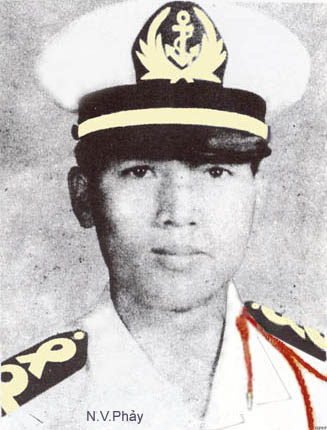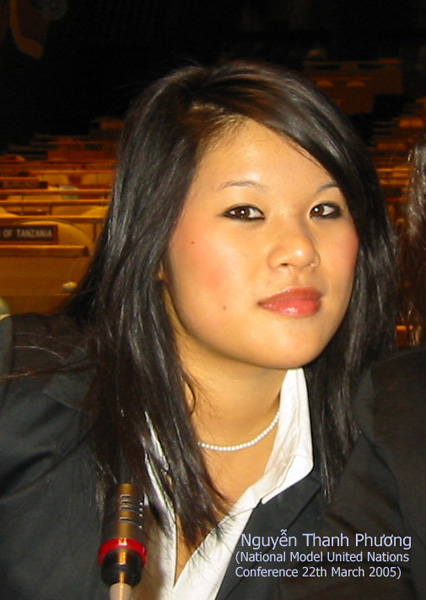What Is a Just War?
Nguyễn Thanh
Phương (17 tuổi)
Sinh viên năm thứ nhất ĐH
Đôi lời về tác giả: Tác giả được sinh ra tại Tây Đức. H́nh của tác giả lúc 17 tuổi, trưởng phái đoàn gồm 8 sinh viên Đại học tại Mỹ, đang trước microphone của bục thuyết tŕnh, tŕnh bày về đề tài nghiên cứu của ḿnh trong Đại Hội National Model United Nations (http://www.nmun.org) tại New York ngày 22 tháng 3 năm 2005. Đề tài do Liên Hiệp Quốc đưa ra đại cương “LHQ nên giúp đỡ quốc gia Madagascar, Nam Phi như thế nào để quốc gia đó có thể phát triển?”. Đề tài nầy có khoảng 650 sinh viên và giáo sư tham dự với sự tán thưởng của tham dự viên dành cho thuyết tŕnh viên.
Xin mời xem một bài viết trong Đại Học của Nguyễn Thanh Phương:
What Is a Just War?
For
many years, people have been trying to define a justified war. War
opponents argue that war has to be the last choice. However, sometimes a
nation cannot wait to use war as the last choice but has to act before
it is too late. A last choice can never be certain, and, therefore, can
never decide when the last is. Where would be the last point on a
vicious cycle? If a nation
can not decide when the last step has come and keeps pushing the
conflict away, is the nation going to be responsible for the
consequences? For example, the US declared neutrality at the beginning
of World War I. The US negotiated with Germany in the hope to avoid war,
a delay that increased the severity of the war. However, the US had to
declare war on the Triple Alliance when Germany was violating all
treaties. World War I was one of the most devastating wars with twenty
million casualties. One might ask if this number could have been
significantly reduced if the US had entered the war earlier. Instead,
the US had waited until the threat was in front of the door. Galston, a
professor of the Institute for Philosophy and Public Policy at the
University of Maryland, states the four criteria to go to war, “These
criteria are: (1) The severity of the threat; (2) the degree of
probability of the threat; (3) the imminence of the threat; and (4) the
cost of delay” (Galston, 683). All these criteria are concerned with
the defense of the country. I believe that war is justified as long as
the objection is to defend a nation. It is a worthy effort to examine
the reasons why a nation goes to war.
Again,
in World War II the US showed the same policy of non-involvement until
the threat was on its own doorsteps. This time it was Pearl Harbor that
suffered a surprise attack by Japan on December 7, 1941. Yet, this war
was not unjustified. What would have happened when Japan took over Pearl
Harbor to build their military base and attack the main land of the US
from there, killing millions of civilians? In an effort to save lives of
American soldiers, who were prepared for a bloody invasion of Japan, the
US chose to drop atomic bombs in Hiroshima and Nagasaki, killing 200,000
to 300,000 people. One might argue that this violated all humanitarian
rights because of the civilians’ death rate. These brought Japan to
surrender and ended war in the Pacific. Opposers argue that a war should
never involve civilians. Then, how would they respond to the fact when
Japan took rice plants from the Vietnamese people to have fuel for their
railroads and thus, let thousands of Vietnamese people starve? Japan was
not even in war with the Vietnamese people, yet, they were the victims.
In addition, the long time effects of the attack on Hiroshima were
significant. Japan, Italy and Germany were in an alliance, the so called
Triple and wouldn’t the US have stopped Japan, Japan and its alliances
would have become enormously powerful and emerged to a threat to not
only the US but also the rest of the world.
One
might question the involvement of the US in the Vietnam War as well. Was
this a justified war for the Americans? It was justified because it was
not only a military war but also an economic war. According to
Galston’s severity of the threat there was a clash of capitalism
versus communism. One might ask if an economic war is a threat to a
country. Surely, it would
not involve casualties dying on the combat field but if the country
cannot feed its people because of the economic isolation then it would
be the same outcome as in a military war: Deaths, not because of weapons
but because of starvation. North Vietnam was communistic and wanted to
conquer South Vietnam. The US stepped in, in order to stop the spread of
communism, a movement that threatened to take away the democracy in the
South. The support for North Vietnam probably came from China and Russia,
the leading communistic forces. It was also a war for humanitarian and
freedom purposes for nations which were suppressed. There was the
possibility that the c ommunists conquered South Vietnam, then the
Philippines, and maybe Australia would follow, a so-called domino effect.
This would have been a long time effect with major consequences for the
capitalistic and democratic world. At that point the communists might
have just blocked and controlled all trades between other countries and
some nations would starve. The main ideal of communism is to conquer the
whole world. Even though that the US did not win this war, they weakened
the North Vietnamese military base and probably defended itself and many
other nations in the end. The reason why the domino effect did not occur
is because the communists had internal conflicts in their communistic
beliefs and goals and, therefore, did not pursue their imperialism. The
majority of South Vietnamese people welcomed Americans during the
war.
They believed that they had the right to independence, and even today,
Vietnamese refugees all over the world show their greatest appreciation
for the sacrifices the US and their alliance made for South Vietnam.
Vietnamese refugees are still protesting against the communistic regime
in Vietnam from outside of their home country. My father, a former South
Vietnamese naval officer, is proud to assert: “I will be always
thankful for the support of the Americans in the fight for the right of
Vietnamese people to live in freedom.”
ommunists conquered South Vietnam, then the
Philippines, and maybe Australia would follow, a so-called domino effect.
This would have been a long time effect with major consequences for the
capitalistic and democratic world. At that point the communists might
have just blocked and controlled all trades between other countries and
some nations would starve. The main ideal of communism is to conquer the
whole world. Even though that the US did not win this war, they weakened
the North Vietnamese military base and probably defended itself and many
other nations in the end. The reason why the domino effect did not occur
is because the communists had internal conflicts in their communistic
beliefs and goals and, therefore, did not pursue their imperialism. The
majority of South Vietnamese people welcomed Americans during the
war.
They believed that they had the right to independence, and even today,
Vietnamese refugees all over the world show their greatest appreciation
for the sacrifices the US and their alliance made for South Vietnam.
Vietnamese refugees are still protesting against the communistic regime
in Vietnam from outside of their home country. My father, a former South
Vietnamese naval officer, is proud to assert: “I will be always
thankful for the support of the Americans in the fight for the right of
Vietnamese people to live in freedom.”
There
is a difference between starting a war for the reason of imperialism,
which is the imposition of control over other people through annexation,
military conquest or economic denomination, and starting one because of
the desire to change the unjust government and the support to help to
rebuild a nation after war (Divine, 520). The history of the US should
observe that the US had played a major role in rebuilding the countries
with which they fought. Japan, South Korea and Germany are examples of
defeated nations became very powerful economically and politically.
A
recent topic would be the war in Iraq. One might say that the war with
Iraq provoked disagreement between allies such as Germany and France
against the US. However, the disagreement ignores the danger which the
country is placed. Whom did terrorists attack on 9/11? European
countries were not attacked, and, therefore, barely had any need to
defend themselves. Should the US wait until the terrorists are on its
door steps before it would defend itself? The US had to consider the
imminence and probability of the threat as mentioned in Galston’s
criteria. If the US saw Iraq as the base of terrorism, where military
weapons and funding for terrorism came from, whose government aided Al
Qaeda and trained terrorists, then the war is justified because it is
for the nation’s own defense. Galston states: “The risks of inaction
are far greater than the risks of action” (Galston, 679).
For
example, the US did not open fire on Cuba because it saw no threat in
Cuba. People often argue that a country should negotiate as much as it
can but people often forget that negotiations are only possible with two
equal partners involved. This means that the other person needs to have
the same norms and morals. What sense would it make to negotiate with a
party that believes that a man’s life is worth no more then a dime?
Again,
taking into consideration all these aspects of a just war the US has
been pursuing a just course when the war is to defend the nation. There
have to be sacrifices no matter what. No one likes to go to war and have
sons, fathers and brothers die on the field. Sadly, this is often the
only way to have peace. Ironically, Woodrow Wilson once described World
War I as “war to end all wars” (Divine, 650). History has proven him
wrong. War appears to be part of the human condition and a country has
to be vigilant to defend itself if it is to continue to exist.
Nguyễn Thanh Phương
